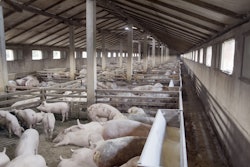
In 2023, 14 member states of the European Union (EU) reported the presence of African Swine Fever (ASF) in domestic pigs, a five-fold increase in outbreaks compared to the previous year.
According to an annual epidemiological report published by the European Food Safety Authority (EFSA), 2023 saw the largest number of ASF outbreaks in domestic pigs since 2014. Most of these outbreaks (96%) were reported in Croatia and Romania.
There was also a 10% increase in ASF in wild boars in 2023, with the virus appearing for the first time in Sweden, Croatia and new areas of Italy. ASF also re-emerged in Greece following a two-year absence.
Germany, Hungary and Slovakia reported fewer outbreaks of ASF in 2023 than the year before.
Recommendations
Prioritizing passive surveillance will be crucial for detection of ASF outbreaks. In other words, the report recommended the testing of wild boar carcasses and that farmers watch for clinical signs of the disease.
“In the Member States, 94% of the outbreaks among domestic pigs were detected through passive surveillance based on clinical suspicion, 3% were identified through contact tracing from affected establishments, and 3% (54 outbreaks) were found as the result of enhanced passive surveillance based on the weekly testing of at least two dead pigs per establishment,” the authors wrote.
Farmers and veterinarians play a particularly important role in reporting suspicious cases, the report stressed.
EFSA plans to release a scientific opinion in October 2024 that will update and revise the risk factors for ASF in both wild boar populations and domestic pigs.


















